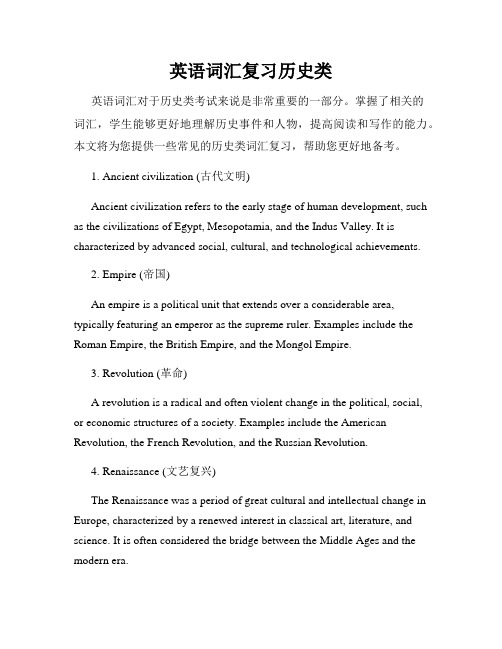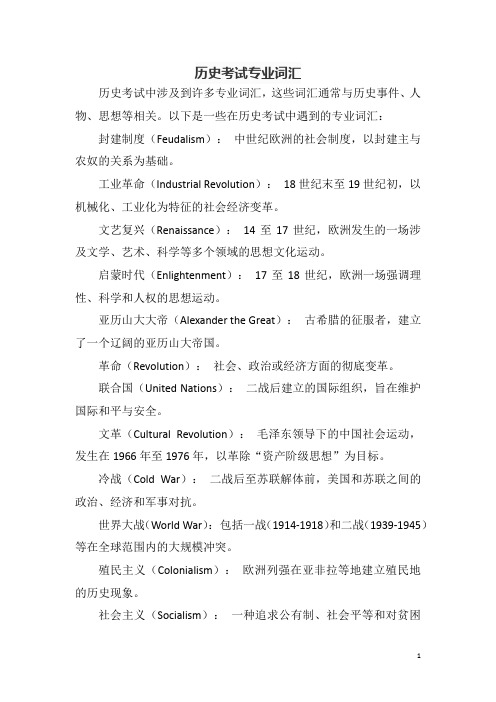关于历史的常用词汇
(历史专业英语词汇

四、 半殖民地、半封建社会 (一)跨文化:Cross-culture
跨文化是跨越了不同国家与民族界线的文化,是不同民族、国家及群体之间 的文化差异,是通过越过体系以经历文化归属性的人与人之间的互动关系。
(二)租界:Concession
指两个国家议订租地或租界章程后,在其中一国的领土上为拥有行政自治 权和治外法权(领事裁判权)的另一国设立的合法的外国人居住地(土地国 有化)。在中国是指近代历史上帝国主义列强通过不平等条约强行在中国获 取的租借地的简称,多位于港口城市。
信仰主义 又称“僧侣主义”。一种贬低理性、宣扬盲目 信从、 以信仰代替知识或赋予信仰以一定意义的学 说。通常是神学家和 唯心主义者贬低科学、抬高信仰的一 种手段。其典型代表人物是 中世纪教父哲学家德尔图良。 信仰主义是一切怀疑论和不可知论 的最后归宿,是剥削 阶级愚弄劳动人民、维护反动统治的工具。 主要人物:德尔图良 思想:主张信仰和理性对立起来。
三、近代史 (一)优生学:Eugenics
优生起源于英国,意思为“健康遗传”。主要是研究如何用有效手段降低 胎儿缺陷发生率。现在优生已经成为一项国家政策,其主要的内容是控制先 天性疾病新生儿,以达到逐步改善和提高人群遗传素质的目的。目前可以通 过科技手段,来确保胎儿健康。目前,我国开展优生工作主要有如下几点: 禁止近亲结婚,进行遗传咨询,提倡适龄生育和产前诊断等。
玄学又称新道家是对《老子》、《庄子》和《周易》的研究和解说。产生 于魏晋。是魏晋时期的主要哲学思潮,是道家和儒家融合而出现的一种哲学、 文化思潮。
(二) 黄老之术:Daoism ['dauizəm]
道教,又称道家、黄老、老氏与玄门等,是中国土生土长的固有宗教。是中 国国人文化催生的,乃是中国人的根蒂,是东方科学智慧之源,是促进科技 发展的宗教以及全球最珍爱生命和尊重女性的宗教。深深扎根于中华传统文 化的沃土之中。据道经记载道教起于盘古开天辟地,元始立教说法。
历史英语词汇大全掌握历史事件与人物的专业术语

历史英语词汇大全掌握历史事件与人物的专业术语历史英语词汇大全:掌握历史事件与人物的专业术语在学习历史的过程中,了解并掌握相关的专业术语是非常重要的。
不仅可以帮助我们更好地理解历史事件和人物,还可以提升我们的学术素养。
本文将为您提供一个历史英语词汇大全,帮助您掌握历史事件与人物的专业术语。
1. Ancient Civilization (古代文明)- Mesopotamia (美索不达米亚): An ancient civilization located in the Tigris-Euphrates river system, known for its invention of writing, development of urban society, and establishment of the world's earliest known legal code, the Code of Hammurabi.- Ancient Egypt (古埃及): A civilization along the Nile River known for its pyramids, pharaohs, and hieroglyphics. It developed a complex religious and funerary system and made significant contributions to mathematics, architecture, and medicine.2. Classical Antiquity (古典古代)- Ancient Greece (古希腊): The birthplace of democracy, known for its philosophers such as Socrates, Plato, and Aristotle. It made significant contributions to literature, theater, and science. Famous city-states include Athens and Sparta.- Ancient Rome (古罗马): A civilization that expanded from a small village to a vast empire, known for its legal system, engineering marvels like the Colosseum and aqueducts, and influence on European culture.3. Middle Ages (中世纪)- Feudalism (封建制度): A social and economic system based on the exchange of land for military service and loyalty. It characterized much of Europe during the Middle Ages.- Crusades (十字军东征): Series of military expeditions by Christians from Western Europe to reclaim the Holy Land from Muslim control. They lasted from the 11th to the 13th century.4. Renaissance (文艺复兴)- Humanism (人文主义): An intellectual movement that emphasized the study of classical texts, the importance of human potential, and the pursuit of knowledge, art, and science.- Leonardo da Vinci (列奥纳多·达·芬奇): An Italian polymath known for his contributions in the fields of art, science, mathematics, and engineering. Best known for his paintings Mona Lisa and The Last Supper.5. Age of Exploration (探险时代)- Christopher Columbus (克里斯托弗·哥伦布): An Italian explorer who completed four voyages across the Atlantic Ocean, opening the way for widespread European exploration and the eventual colonization of the Americas.- Ferdinand Magellan (费尔南多·麦哲伦): A Portuguese explorer who led the first circumnavigation of the globe. His expedition proved that the Earth was round.6. Industrial Revolution (工业革命)- Steam engine (蒸汽机): Invented by James Watt, the steam engine was a key invention that revolutionized transportation, manufacturing, and agriculture during the Industrial Revolution.- Factory system (工厂体系): A method of manufacturing that brought workers and machinery together in one place, leading to increased efficiency and mass production.7. World Wars (世界大战)- Treaty of Versailles (凡尔赛条约): The peace treaty signed in 1919, officially marking the end of World War I. It placed full blame on Germany and imposed heavy reparations, leading to future political and economic tensions.- D-Day (诺曼底登陆): The Allied invasion of Normandy, France on June 6, 1944, during World War II. It marked a major turning point in the war and led to the eventual defeat of Nazi Germany.通过了解并熟练掌握这些历史英语词汇,我们可以更深入地了解历史的各个时期和相关的事件与人物。
2023高考历史选择题高频词汇

2023高考历史选择题高频词汇1. 黄帝时期- 记载世界最早的中国历史时期;- 对于中华民族的形成与发展具有重要意义;- 黄皮肤的祖先;- 文化、宗教和政治等方面有深远影响。
2. 夏朝- 中国历史上第一个有文字记载的朝代;- 建都于河南安阳;- 有材料记载证明的中国历史最早朝代。
3. 商朝- 与夏朝同时期的朝代;- 著名的文物是甲骨文;- 是中国历史上最早记载的王朝。
4. 周朝- 分为西周和东周;- 周天子实行天命思想;- 周天子分封诸侯,实行封建制度;- 社会政治发展的时期,也是诸侯国频繁征战的时期。
5. 春秋战国时期- 春秋和战国是中国历史上的连续时期;- 是中国古代文化思想发展的重要时期;- 诸侯之间频繁争斗,各国力量大致平衡。
6. 秦朝- 中国历史上第一个统一的封建中央集权王朝;- 秦始皇统一六国,建立起中央集权制度;- 著名的事迹是焚书坑儒、修建万里长城。
7. 汉朝- 是中国历史上继使秦统一后的封建王朝;- 在农业、手工业、商业、科技和文化等方面取得了较大发展;- 兴办学校,推行儒学教育。
8. 三国时期- 中国历史上的一个特殊历史时期;- 三个势力的争霸,三个割据分裂;- 曹操、刘备、孙权是这个时期的代表。
9. 隋朝- 是中国历史上继续魏晋南北朝之后的封建王朝;- 它的统一结束了南北朝分裂的局面;- 高度重视维护社会稳定。
10. 唐朝- 是中国历史上最灿烂的封建王朝;- 实行科举制度,为国家选拔人才;- 丝绸之路通商发展,辉煌的地理位置。
11. 宋朝- 是中国历史上的一个朝代;- 北宋和南宋两个时期;- 科技、艺术和文化方面取得很大的发展。
12. 元朝- 是中国历史上由蒙古族所建立的封建王朝;- 北京成为都城;- 世界上最大的封建王朝。
13. 明朝- 是中国历史上继元朝之后的一个封建王朝;- 地地道道的中国人自己政权;- 世界文明史上有重要地位。
14. 清朝- 是中国历史上朝代最后一政权;- 是清朝统治者的一个民族称谓。
历史的形容词英语

历史的形容词英语
在英语中,描述“历史的”形容词有很多,下面列举一些常见的形容词:
Antiquarian - 与古物或古董有关的。
Archaeological - 与考古学有关的。
Ancestral - 祖先的,从祖先那里继承下来的。
Epochal - 标志一个时代开始的。
Chronological - 按时间顺序的,按年月顺序的。
Historic - 具有历史意义的,重大的。
Historical - 与历史有关的,基于历史的。
Literary - 在文学上的,与文学有关的。
Monumental - 巨大的,不朽的。
Pioneering - 开创性的,先驱的。
以上形容词都可以用来描述“历史的”事物或事件,但在具体使用时需要根据语境来选择最合适的形容词。
例如,“Historical events”指的是历史上发生的事件,“Historical fiction”指的是基于历史的小说,“Historical monument”则指的是具有历史意义的纪念碑。
此外,还有一些复合形容词,如“old-fashioned”、“old-world”、“vintage”、“classic”、“traditional”等,也可以用来描述具有历史特征的事物或事件。
这些形容词通常与特定的文化、时代或风格相关联,因此在描述历史特征时需要根据具体情况来选择使用。
总之,在英语中描述“历史的”形容词有很多,需要根据具体的语境来选择最合适的形容词,以准确地表达所要描述的事物或事件的特征。
历史学专业英语词汇

Unit 1history ['histri] n. 历史,历史学narrative ['nærətiv] n. 记事,叙事Herodotus [hə'rɔdətəs] n. 希罗多德circa ['sə:kə] prep. (拉丁语)大约(简写c., ca., cir., circ., C.)Thucydides [θju'sidədi:z] n. 修昔底德chronological [.krɔnə'lɔdʒikəl] adj. 年代学的,按年代顺序的territorial [.teri'tɔ:riəl] adj. 区域性的,地方性的thematically [θi'mætikli] adv. 按主题方式,按专题方式Big History 大历史(学派)archaeology [.ɑ:ki'ɔlədʒi] n. 考古学methodology [.meθə'dɔlədʒi] n. 方法论approach [ə'prəutʃ] n. 研究方法discipline ['disiplin] n. 学科perspective [pə'spektiv] n. 观点the humanities [hju:'mænitiz] 人文学科the social sciences 社会科学classification [.klæsifi'keiʃən] n. 分类anthropology [.ænθrə'pɔlədʒi] n. 人类学global history 全球史historiography [.histɔ:ri'ɔgrəfi] n. 历史编纂学,史学史,文献学biographical [.baiə'græfikəl] adj. 传记的,传记体的thematic [θi'mætik] adj. 主题的,专题的medieval [medi'i:vəl] adj. 中世纪的philosophy of history 历史哲学meta-level ['metə 'levəl]总体层面,元级teleological [.teli'ɔlədʒikəl] adj. 目的论的diplomatic [.diplə'mætik] adj. 外交的historical method 史学方法primary sources 原始材料epistemology [i.pisti'mɔlədʒi] n. 认识论Peloponnesian [.peləpə'ni:ʃən] adj. 伯罗奔尼撒半岛的divine [di'vain] adj. 神的,神圣的chronology [krə'nɔlədʒi] n. 编年史cyclical ['saiklikl] adj. 循环的posthumous ['pɔstjuməs] adj. 身后的,死后的dynastic [dai'næstik] adj. 王朝的Saint Augustine [seint ɔ:'gʌstin] n. 圣奥古斯丁Christian ['kristjən] adj. 基督教的,基督教徒的the Renaissance [rə'neisəns] n. 文艺复兴,文艺复兴时期religious [ri'lidʒəs] adj. 宗教的Hegel ['heigl] n. 黑格尔secular ['sekjulə] adj. 世俗的Ranke [ræŋk] n. 兰克epic ['epik] adj. 史诗的,叙事的;史诗,叙事诗nationalistic [.næʃənəl'istik] adj. 民族主义的Fernand Braudel [fer'nan brɔ'del] 费尔南•布罗代尔Le Roy Ladurie [lə rwa ladju'ri:] 拉鲁瓦•拉杜里Marc Bloch [mark blɔk] 马克•布洛克Lucien Febvre [lysjæn fevr] 吕西安•费弗尔multi-disciplinary [.mʌlti'disiplinəri] adj. 多学科的the Annales ['ænəlz] School 年鉴学派quantitative history 数量史学raw data 原始数据ethnic ['eθnik] adj. 族群的,族裔的racial ['reiʃəl] adj. 种族的genre ['ʒɑ:nrə] n. 类型,流派,风格history of everyday life 日常生活史Marxist ['mɑ:ksist] adj., n. 马克思主义(者)的;马克思主义者Eric Hobsbawm ['erik 'hɔbsbɔm] 埃里克•霍布斯鲍姆Georges Lefebvre [ʒɔrʒ lə'fevr] 乔治•勒费弗尔François Furet [fran'swa fy're] 弗朗索瓦•弗雷Roland Mousnier [rɔ'lan mu:'njei] 罗兰•穆尼埃anti-Marxist adj. 反马克思主义的feminist ['feminist] adj. 女性主义的,女权主义的;女权主义者postmodernist [.pəust'mɔdərnist] n., adj. 后现代主义者;后现代主义(者)的Richard Evans ['ritʃəd 'evənz] 理查德•埃文斯Keith Windschuttle [keiθ 'winʃʌtl] 凯斯•温修德historical periodization [piəriədai'zeiʃən] 历史分期classificatory [.klæsifi'keitəri] adj. 类别的,分类上的retrospective [.retrəu'spektiv] adj. 事后回想的,回顾的the Gilded Age 镀金时代the Dark Age(s) 黑暗时代the First World War 第一次世界大战decimal ['desiməl] adj. 十进法的,以十为基础的talismanic [.tæliz'mænik] adj. 护符(般)的,有护符般效力的the Victorian [vik'tɔ:riən] Era 维多利亚时代the Napoleonic [nə.pəuli'ɔnik] Era 拿破仑时代the Meiji ['mei'dʒi:] Era 明治时代the Merovingian [.mærə'vindʒiən] Period 墨洛温王朝时期Romantic [rə'mæntik] period 浪漫主义时期the sexual ['seksjuəl] revolution 性革命conservative [kən'sə:vətiv] adj. 保守的Roman Catholic ['kæθəlik] culture 罗马天主教文化Franco ['frɔŋkəu] n. 弗朗哥Unit 2primitive culture 原始文化Paul Tournal [pɔl turnal] 保罗·杜纳尔anté-historique ['a:ŋtei 'istɔrik] n.(法语)史前的prehistoric ['pri:his'tɔrik] n. 史前的Daniel Wilson ['dænjəl 'wilsn] 丹尼尔·威尔逊prehistorian [pri:hi'stɔ:riən] n. 从事史前史研究的专家,史前史学家the Stone Age 石器时代the Bronze Age 青铜器时代the Iron Age 铁器时代excavation [.ekskə'veiʃən] n. 发掘geologic [dʒiə'lɔdʒik] adj. 地质学的geographic [dʒiə'græfik] adj. 地理学的literate ['litərit] adj. 识字的,有文化的geneticist [dʒi'netisist] n. 遗传学家linguist ['liŋgwist] n. 语言学家paleontology [.pæliɔn'tɔlədʒi] n. 古生物学biology [bai'ɔlədʒi] n. 生物学geology [dʒi'ɔlədʒi] n. 地质学archaeoastronomy [.ɑ:kiəuəs'trɔnəmi] n. 考古天文学linguistics [liŋ'gwistiks] n. 语言学molecular [mə'lekjulə] adj. 分子的genetics [dʒi'netiks] n. 遗传学archaeological [.a:kiə'lɔdʒikəl] adj. 考古的,考古学上的artifact ['ɑ:tifækt] n. 人工制品anonymous [ə'nɔniməs] adj. 无名无姓的,匿名的Neanderthal [ni'ændətɑ:l] n. 尼安德特人academic [.ækə'demik] adj. 学术上的,从事学术研究的New Guinea [nju: 'gini] n. 新几内亚Paleolithic [.pæliəu'liθik] n. 旧石器时代;adj. 旧石器时代的the Lower Paleolithic 旧石器时代早期Homo sapiens ['həuməu 'seipienz] n. 智人(现代人的学名)Homo habilis ['həuməu 'hæbilis] n. 能人species ['spi:ʃi:z] n. 种类,物种usher ['ʌʃə] vi. 引入,引导anatomic [.ænə'tɔmik] adj. 解剖学上的burial ['beriəl] n. 埋葬,葬礼,坟墓sophisticated [sə'fisti.keitid] adj. 复杂的,精密的,老练的highlight ['hailait] n. 精彩部分,闪光点the Middle Paleolithic 旧石器时代中期the Cro-Magnon ['krəʊ'mænjɔŋ] n. 克罗马尼翁人nomadic [nəu'mædik] adj. 游牧的,游牧民族的,流浪的hunter-gatherer n. 捕猎采集者egalitarian [i.gæli'tɛəriən] adj. 平等主义的sedentary ['sedən.təri] adj. 定居的,固定不动的chiefdom ['tʃi:fdəm] n. 首领的地位,首领的权威stratification [.strætifi'keiʃən] n. 分层indigenous [in'didʒinəs] adj. 土著的,土生土长的,本地的the Upper Paleolithic 旧石器时代晚期Mesolithic [.mesə'liθik] n. 中石器时代;adj. 中石器时代的the Middle Stone Age 中石器时代Neolithic [.ni:əu'liθik] n. 新石器时代;adj. 新石器时代的Pleistocene ['plaistəusi:n] n. 更新世;adj. 更新世的millennia [mi'leniə] (millenniums) n. 数千年marshland ['mɑ:ʃlænd] n. 沼泽地midden ['midn] n. 贝冢deforestation [.di:fɔris'teiʃən] n. 森林开发,滥发森林composite ['kɔmpəzit] adj. 合成的,复合的flint [flint] n. 极硬的东西,打火石microlith ['maikrəliθ] n. 细石器microburin [.maikrə'bjuərin] n. 小雕刻刀tackle ['tækəl] n. 用具,滑车adze, adz [ædz] n. 锛子canoe [kə'nu:] n. 独木舟bow [bəu] n. 弓the New Stone Age 新石器时代domestication [də.mesti'keiʃən] n. 驯养,驯化warfare ['wɔ:fɛə] n. 战争,战事Stonehenge ['stəun'hendʒ] n. 巨石阵millennium [mi'leniəm] n. 一千年Sumerians [su:'miriəns] n. 苏美尔人Peru [pə'ru:] n. 秘鲁Mesoamerica [.mezəuə'merikə] n. 中美洲the Fertile Crescent ['kresənt] n. 新月沃地(西亚伊拉克两河流域连接叙利亚一带地中海东岸的一片弧形地区,为上古文明发源地之一)irrigation [.iri'geiʃən] n. 灌溉the Metal Age 金属时代Chalcolithic [.kælkə'liθik] n. 铜石并用时代;adj. 铜石并用时代的the Old World 旧大陆,东半球(尤指欧洲)metallurgy [me'tælədʒi] n. 冶金术,冶金学metalworking ['metəl.wə:kiŋ] n. 金属加工tin [tin] n. 锡outcropping ['autkrɔpiŋ] n. 露出,露出地表arsenic ['ɑ:sənik] n. 砷,砒霜ferrous ['ferəs] adj. 含铁的cradle ['kreidəl] n. 摇篮,发源地valley ['væli] n. 流域Euphrates [ju:'freiti:z] n. 幼发拉底河Tigris ['taigris] n. 底格里斯河Mesopotamia [.mesəpə'teimiə] n. 两河流域Nile [nail] n. 尼罗河Indus ['indəs] n. 印度河subcontinent [sʌb'kɔntinənt] n. 次大陆adjacent [ə'dʒeisənt] adj. 临近的implement ['implimənt] n. 工具,器具ornament ['ɔ:nəmənt] n. 装饰物,装饰。
英语词汇复习历史类

英语词汇复习历史类英语词汇对于历史类考试来说是非常重要的一部分。
掌握了相关的词汇,学生能够更好地理解历史事件和人物,提高阅读和写作的能力。
本文将为您提供一些常见的历史类词汇复习,帮助您更好地备考。
1. Ancient civilization (古代文明)Ancient civilization refers to the early stage of human development, such as the civilizations of Egypt, Mesopotamia, and the Indus Valley. It is characterized by advanced social, cultural, and technological achievements.2. Empire (帝国)An empire is a political unit that extends over a considerable area, typically featuring an emperor as the supreme ruler. Examples include the Roman Empire, the British Empire, and the Mongol Empire.3. Revolution (革命)A revolution is a radical and often violent change in the political, social,or economic structures of a society. Examples include the American Revolution, the French Revolution, and the Russian Revolution.4. Renaissance (文艺复兴)The Renaissance was a period of great cultural and intellectual change in Europe, characterized by a renewed interest in classical art, literature, and science. It is often considered the bridge between the Middle Ages and the modern era.5. Industrialization (工业化)Industrialization refers to the process of transforming an agrarian, rural society into one based on industry and manufacturing. It is often associated with the rise of factories, urbanization, and technological advancements.6. Colonialism (殖民主义)Colonialism is the policy or practice of claiming and dominating foreign lands and peoples. It was a significant feature of European expansion during the 15th to 20th centuries. Examples include the British Empire and the Scramble for Africa.7. Nationalism (民族主义)Nationalism is an ideology that emphasizes the interests, culture, and self-determination of a particular nation or group of people. It played a significant role in the breakup of empires and the formation of new nations in the 19th and 20th centuries.8. World War (世界大战)A world war is a conflict involving multiple nations on a global scale. The two most famous examples are World War I and World War II, which had a profound impact on the political and social landscape of the 20th century.9. Cold War (冷战)The Cold War was a state of geopolitical tension between the United States and the Soviet Union and their respective allies. It lasted from the late1940s to the early 1990s and was characterized by political, economic, and military competition.10. Civil rights movement (民权运动)The civil rights movement was a social and political movement advocating for equal rights and treatment for racial minorities, primarily in the United States. It peaked in the 1950s and 1960s and led to significant legislative and social changes.以上是一些常见的历史类英语词汇,通过对这些词汇的复习,您将能够更好地理解历史事件和人物,并在考试中取得更好的成绩。
学习描述历史事件和人物的词汇

学习描述历史事件和人物的词汇历史是人类社会发展的镜子,了解历史事件和人物对于我们理解过去、认识现在以及展望未来都具有重要意义。
在学习历史的过程中,掌握描述历史事件和人物的词汇是必不可少的。
本文将介绍一些常用的词汇,旨在帮助读者更好地描述历史事件和人物。
一、描述历史事件的词汇1. 发生(occur):指某个事件在某个时间和地点发生。
例如:The French Revolution occurred in the late 18th century.(法国大革命发生在18世纪末。
)2. 导致(lead to):表示某个事件引发了另一个相关的事件。
例如:The assassination of Archduke Franz Ferdinand led to the outbreak of World War I.(弗朗茨·费迪南德大公的暗杀导致了第一次世界大战的爆发。
)3. 影响(influence):指某个事件对社会、政治、经济等方面产生的影响。
例如:The Industrial Revolution had a profound influence on the world economy.(工业革命对世界经济产生了深远影响。
)4. 变革(transform):表示某个事件引发了重大的社会、政治或文化的变化。
例如:The Renaissance transformed European society and culture.(文艺复兴改变了欧洲社会和文化。
)5. 扩张(expand):指某个国家或帝国通过征服、殖民或领土扩张等方式增加了自身的势力范围。
例如:The Roman Empire expanded itsterritories through military conquests.(罗马帝国通过军事征服扩张了其领土。
)二、描述历史人物的词汇1. 领导者(leader):指在某个时期或事件中起领导作用的人。
历史考试专业词汇

历史考试专业词汇历史考试中涉及到许多专业词汇,这些词汇通常与历史事件、人物、思想等相关。
以下是一些在历史考试中遇到的专业词汇:封建制度(Feudalism):中世纪欧洲的社会制度,以封建主与农奴的关系为基础。
工业革命(Industrial Revolution):18世纪末至19世纪初,以机械化、工业化为特征的社会经济变革。
文艺复兴(Renaissance):14至17世纪,欧洲发生的一场涉及文学、艺术、科学等多个领域的思想文化运动。
启蒙时代(Enlightenment):17至18世纪,欧洲一场强调理性、科学和人权的思想运动。
亚历山大大帝(Alexander the Great):古希腊的征服者,建立了一个辽阔的亚历山大帝国。
革命(Revolution):社会、政治或经济方面的彻底变革。
联合国(United Nations):二战后建立的国际组织,旨在维护国际和平与安全。
文革(Cultural Revolution):毛泽东领导下的中国社会运动,发生在1966年至1976年,以革除“资产阶级思想”为目标。
冷战(Cold War):二战后至苏联解体前,美国和苏联之间的政治、经济和军事对抗。
世界大战(World War):包括一战(1914-1918)和二战(1939-1945)等在全球范围内的大规模冲突。
殖民主义(Colonialism):欧洲列强在亚非拉等地建立殖民地的历史现象。
社会主义(Socialism):一种追求公有制、社会平等和对贫困的关切的政治经济体制。
这只是一个小小的范例,历史考试中的专业词汇会根据考试范围和内容有所不同。
建议参考具体的历史教材和考试大纲,以了解相关的专业词汇。
- 1、下载文档前请自行甄别文档内容的完整性,平台不提供额外的编辑、内容补充、找答案等附加服务。
- 2、"仅部分预览"的文档,不可在线预览部分如存在完整性等问题,可反馈申请退款(可完整预览的文档不适用该条件!)。
- 3、如文档侵犯您的权益,请联系客服反馈,我们会尽快为您处理(人工客服工作时间:9:00-18:30)。
关于历史的常用词汇据360教育集团介绍:
Indian
印第安人
Giotto
乔托
Buonarroti Michelangelo
米开朗琪罗
Niccolò Machiavelli
马基雅维利
Miguel de Cervantes
塞万提斯
Medieval Period
中世纪
Commercial Revolution
商业革命
Colonialism
殖民主义
slave trade
奴隶贸易
Renaissance
文艺复兴
Humanism
人文主义
Dante
但丁
The Reformation
宗教改革
Calvinists
加尔文派
enclosure movement 圈地运动
House of Stuart
都铎王朝
House of Stuart
斯图亚特王朝
the Anglican Church 英国国教
Puritan
清教徒
Oliver Cromwell
克伦威尔
Lord Protector
护国公
Whig
辉格党
Tory
托利党
Glorious Revolution
光荣革命
Bill of Rights
《权利法案》
Constitutional Monarchy
君主立宪制
House of Bourbon
波旁王朝
House of Habsburg
哈布斯堡王朝
Mercantilism
重商主义
Peter the Great
彼得大帝
The Palace of Versailles 凡尔赛宫
enlightened despotism
开明专制
British East India Company 英国东印度公司
Navigation Acts
《航海条例》
Seven Year’s Wa
r七年战争
Enlightenment
启蒙战争
Encyclopedists
百科全书
the Third Estate
第三等级
Louis XⅥ
路易十六
The Estate-General
三级会议
National assembl
国民议会
Constituent Assembly
制宪议会
the Bastille
巴士监狱
French Revolution
法国大革命
Declaration of the Rights of Man and of the Citizen 《人权宣言》
the Jacobins
雅各宾派
Thermidorian Reaction
热月政变
Directory Government
督政府
Coup d’Etat of Brumaire
雾月政变
the First French Empire
法兰西第一帝国
the Consulate
执政府
the Code Napoleon
《拿破仑法典》
Battle of Waterloo
滑铁卢战役
Common Sense
《常识》
The Continental Congress
大陆会议
Declaration of Independence 《独立宣言》
Shogunate
幕府
samurai
武士
Sedusion Orders
锁国令
the Mughal Empire
莫卧儿帝国
Industrial Revolution 工业革命
flying-shuttle
飞梭
spinning-jenny
珍妮纺纱机
spinning-mule
骡机
water-frame
水力织布机
The Age of Steam
蒸汽时代
The Wealth of Nations 《国富论》
the Congress of Vienna 维也纳会议
Vienna System
维也纳体系
Holly Alliance
神圣同盟
Quadruple Alliance
四国同盟(1813)
Luddite movement
卢德运动
The Communist Manifesto
共产党宣言
Communist League
共产主义者同盟
Scientific Socialism
科学社会主义
Marxism
马克思主义
International Working-men’s Association 国际工人协会
First International
第一国际
Commune of Paris
巴黎公社
Westward Movement
西进运动
Free State
自由州
Slave State
蓄奴州
Homestead Act
宅地法
Emancipation Proclamation 解放黑人奴隶宣言
Civil War (U.S.)
美国内战
Iron and Blood
铁血政策
Meiji Restoration
明治维新
Crimean War
克里米亚战争
the Ottoman Empire
奥斯曼帝国
Bābism
巴布教
Ernst Werner von Siemens 西门子
The Treaty of Kanghua 《江华条约》
The Treaty of Portsmouth 《朴茨茅斯和约》
Suez Canal
苏伊士运河
Second International
第二国际
Vladimir Ilich Lenin
列宁
Austria-Hungary
奥匈帝国
the Triple Alliance
三国同盟
the Triple Entente
三国协约
Archduke Ferdinand
斐迪南大公。
